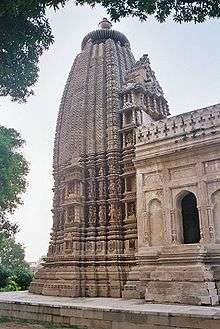Jain temples of Khajuraho

| Part of a series on |
| Jainism |
|---|
 |
|
Jain Prayers |
|
Practice |
|
Major figures |
|
Major Sects |
|
Festivals |
|
Pilgrimages |
| Jainism portal |
During the Chandela rule, many towns in Bundelkhand, including Khajuraho, were home to large and flourishing Jain communities. At Khajuraho the Jains apparently lived on the east side of town. A number of Jain temples from that period have survived in this part of Khajuraho in various states of preservation. Many Jain inscriptions from the Chandela period can be seen at Khajuraho.[1] All the Jain temples are now enclosed within a compound wall constructed in early 12th century, with the exception of the Ghantai temple.
Temples
Two of the large temples still stand in a good state of preservation.
- Parshvanath Temple
This temple contains an inscription dating from 954 AD by its builder Pahil, mentioning donation of gardens and requesting future generations to safeguard the temple. It mentions Chandella Dhanga as the reigning king.[2]
A well known early magic square is found in this temple.[3]

| ||||||||||||||||
| transcription of the indian numerals |
This is referred to as the Chautisa Yantra, since each sub-square sums to 34.
- Adinath Temple
The Adinath Jain temple contains an idol with an inscription dated Samvat. 1215 during the rule of Chandella king Madanavarman.
- Shantinath Temple
The Shantinath Temple is a modern composite structure that incorporates sections of several temples and has several shrines. The main section has a 12-foot-tall (3.7 m) idol of Lord Shantinath with an inscription of Sam. 1085.
Gallery
-
Main Idol at Shantinath Jain Temple, Khajuraho India
-
Jain Temple at the back side of Shantinath Temple, Khajuraho India
-
Jain Museum, Khajuraho India
-
Jain Museum, Khajuraho India
See also
References
External links
- Get Bundelkhand Jainism Place Information in Hindi on Bundelkhand Darshan
- Khajuraho Jain Temples
- Shri Digamber Atishay Kshetra, Khajuraho
| ||||||||||||||||||||||||||||||||||||||||||||||||||||||||||
| ||||||||||||||||||||||||||||||||||||||||||||||||||||||||||||||||||||||